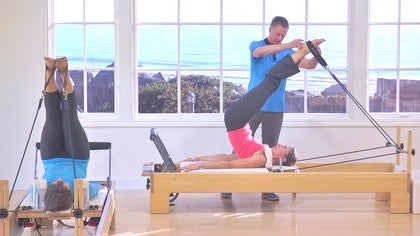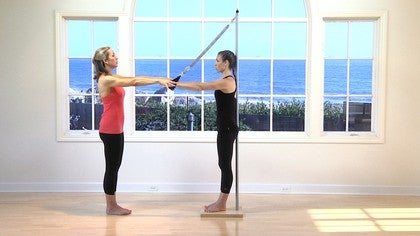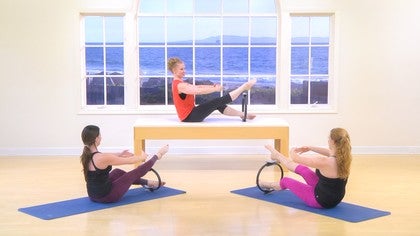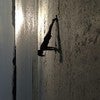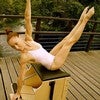Description
You can watch the Percussive Breathing Tutorial to learn more about the Fletcher Breathing that Jonathan used in this class.
About This Video
Transcript
Read Full Transcript
This reformer class is focusing on really the sensory experience of doing [inaudible]. I'm gonna be giving a lot of, uh, variations that I've learned from Ron Fletcher, just pieces of his pieces. But the reason I'm doing that is not so much to teach the whole piece, but just to bring something new to the work for the students so they can experience something so somewhat familiar in a slightly different way. And the focus is really, uh, the what, what the personal experience, the personal, uh, feelings that are brought about by doing, uh, the different movements. And it's also a full movement experience in that, uh, there's strengthening and, and spinal movements in all the planes of motion. So we're going to start with, uh, the mount to the reformer that I learned from Ron.
Ron didn't like it when people just came into the studio and, uh, would lie down, just kind of waiting like this. So, so there's more specific mount in order to prepare the body for, for what's going to happen. So I have Becca and Juliana here, Becca, Juliana, and um, we're gonna start. So what we'd like you to place yourself as just right in front of your reformer or, and you're gonna be closer to the foot bar so that when you sit down, you're ready to just roll back on the reformer and you're gonna bring your feet together. Good. And first, are you familiar with the percussive breathing at all or you've aware of that? So, so we're gonna do the percussive breath and if you want more information about the percussive breath, I just watched Curia Saban's tutorial tutorial on that, which really explains it beautifully. So, uh, one of the things that she really stresses is that it's not the sound so much that's important. It's the what it does to the body. So I'm gonna actually just have you take your hands here just on your lower abdominal wall, just above the pubic bone and just to feel what's going on here.
So what you're going to take an inhale through the nose and exhale through the mouth.
So we'll just do a little arm motion with it just to bring that into it. So here we go. And
So take some time to just sense those three points and then lower the toes down. So when you lift the toes, it just intensifies that sense of, uh, of, of the tripod of the feet. So go ahead and inhale and exhale.
But most importantly, you're starting to become more aware of your relationship, of your feet to the floor. And that'll be important when we go onto the reformer during the foot bar tomorrow and the last.
Make sure you're nice and forward, and then you're going to lie back. Rolling the spine back one vertebra at a time. Good. All right, so the first motion, the first, um, place foot placement is what Ron called the prehensile foot position. So you're gonna place, go ahead and just bring the feet up onto the foot bar. Think about those foot centers that we just established that you just were aware of. And especially the front two foot centers.
So the feet are are placed right on those front two foot centers. You're going to wrap your, your toes over the bar and bring your heels under the bar. So it's a prehensile position. All right. And would I like to think of when when we start the foot work is that you commit to the foot placement and the spinal placement when the carriage is in and then you're going to maintain that spinal placement in the foot placement. The same as you move. Okay, good. Well let's just go ahead and start moving.
You're going to inhale and lengthen out. Go ahead. Inhale and exhale. Very good. Nice breathing and lengthen and come in very good. Feel that placement of the feet and heal the length of your spine on the table. Good. Alright, and just watch this feeling go by so you don't have to make eye contact with me. It's very polite of you to do so. But just keep your, your face.
I like to think of the face, the profile of the faced in parallel, which is hard to feel sometimes. Good for more of these. Inhale and exhale Unifor in here. And exhale, two more. Good. Keeping the heels just where they aren't space, but still finishing the motion all the way out. Last one here, all the way out. Very good. And come in.
Now we're going to do a pulse and I'm going to define the pulse for you. Very specifically. You're going to press out about an inch, just an inch away from the bumper, right? You know what I mean by the bumper is you're out about an inch from the bumper and then from there you're going to go about a third of the dirt, a third of the distance from there. So just go a third of the way and be a little more, you can be a little more Janice. I'd say that's about a third. And then back to the bumper. Almost the bumper, almost touching the bumper but not quite. Do you see? Good.
So that's the range of motion. Now you all are very um, careful and clean with your motion, but I'm going to ask for you to do though is throw a little momentum into this. So it's not real precious movement. There's a little bit out in d c yeah, and then you have to, you throw momentum into it, but then you catch it. Now I need to tell you the breath, don't I? So it goes in hair and x hair in hell and very good out in, out, and in. Inhale, inhale, exhale, exhale, come all the way in. So those, those pulses came from Ron and he had, he'd do, he'd work on his knees a lot. So he, he developed those pulses just to increase the, the strengthening of the knees.
Now you're going to press all the way out. This is how we finished the, the, this first part of the movement. And you're going to reach your arms up towards the ceiling. And as you reach the arms up to the ceiling, I'd like you to just feel your shoulders. Just feel where they are in space. Don't judge it. Just notice your shoulders and then also notice your neck and jaw.
Is there any under undue tension there? And release that if need be, and bring the arms down and bend in. Good. So Ron also had to work a lot on his neck. And so he added what he called the Gazintas to two with the footwork because he felt like when he did a lot of footwork every, he didn't, uh, attend to his neck and children's as much. So there's a whole plethora of our movements he did.
We're just going to do this simple arm lift and lower. Now it's time to place the heels on the bar. So just going to play those place the heel centers on the bark and you flex back and you're going to commit to whoops. Really flexing back here. Good. Got It. Got It. Okay. Is that okay in your ankle? Yeah. Yeah. Okay. You're gonna lengthen out. Inhale and bending. Exhale. Very good.
And linkedin, and then good for this one. What I'd like you to be aware of as you're moving out in, in, is are your hips and how the hips are working. So I'm gonna ask you to take your fingertips on what I call the hip crease. The hip crease. Go ahead and come in. Is Right here, right where the hip bands. And what you're going to do is as you press out in, in monitor those hip creases, right? And make sure that they're moving equally and simultaneously. Make Sense. So, and we, it stands to reason that if your hips are working symmetrically, the pelvis has to be symmetrical. Two more, just like that.
Out and in, out. And now we're gonna shift gears back through that pot. Ready? Go out in, out, in, in, in health care to XL for too good. Shh. Good. Two more sets. That's one set. That's the second set.
Now you're going to stretch all the way out. Good. Reach your arms up, acknowledge your shoulders, acknowledge your neck, jaw, and then bring the arms down and bring the carriage in. Go ahead. Let's see how this goes. You're going to bring the knees, bring the feet slightly off the foot bar, extend the legs up towards the ceiling. Good. Now we're going to work with the hips again and you're going to turn out from the hips. Make Your v and back to parallel. Good. I'm going to let go. Turn out parallel. Good. Inhale, exhale. So I'd just like you to feel the hip joints moving the ball in the socket, moving and feel how the hip joint movement creates that Pilates v position.
One more of these great students, and you're going to stay in that turnout. Bend the knees. You're going to place the feet right in the center of the foot bar ahead. All right, stretching out. Inhale and exhale. Very good. Inhale and exhale.
Go ahead. And as I watch you work at, what I'd like to ask for you to sense is that the movement is still a hip motion. It's not a knee straightening exercise. But really see if you can show me that you're initiating the emotion from your, from your backside, right. Good and real. And finish the motion. So you stretch all the way out. All the way in. One more. All the way out. Good. All the way in pulses. Here we go. Oh, in Alden, n o n a. Then in good, little smaller. Hard to keep up. Okay, let's do a couple more all together. Come on in.
We're gonna do two more sets altogether. It's gonna go like this.
A little poster by the ears. Good. So another thing that I learned from Ron, he really added a lot of rotational movements into the work. He, he's always said he liked people to see people move their middles more. So what? That's what we're going to do. So you're going to keep your shoulder blades connected onto the carriage, but the pelvis and the hips are going to rotate to your right.
So it goes like this. Okay. Now this is another pulse. It's not an out an impulse though. It's a pulse into the stretch. We're going to 16 of them. And you go pulse, pulse, pulse, and pulse. Yes. Inhale, inhale, exhale. Exhale. Two more sets in him. And exhale. One more set. Inhale. And Ex Haile very good. Back to the middle and to the other side. Yeah, it's just like a little oscillation. So you'd go pulse, pulse, pulse, pulse. Inhale for two, exhale for two.
Inhale for two, exhale for two. One more set, Barry. Good. Back to the middle. Nicely done. Now, arms come next. Next to your body. You're going to press out and just take a moment and look at your feet and just make sure they're in the middle. Because sometimes when we do those rotations, things can get off. Yep. Awesome. Glad. But sometimes that does happen that when you do those twists your, you lose your center. Now you're going to do the tennis stretch and you're going to take four counts. You're gonna take three counts to lower your heels.
So it's going to be very slow. Lower to three and then up on one four. So I'll kind of out, here we go. And inhale two, three, exhale. Inhale, two, three, exhale up. Very nice, nice. And lift lower to three and lift lower two, three. And lift. Good.
She aware that you [inaudible] you don't want your knees to roll in as you do these lower. So really hold the sit bones together. That sometimes works to keep the legs more parallel. Sh two more sets and lift last hour, two, three and lift and Bandana. Very nicely done. Good. All right. I'm gonna ask you both just rise up and go to, um, two springs. Oh my gosh.
You only had one spring that whole time. No wonder. Okay, let's go to two springs. Okay. All right. To read. All right. Wow. Good job. So, uh, you're gonna just find your loops by your ears there. And we've set up the loops, just pretty s sometimes a little shorter than sometimes. So we just set the loops up so they matched over the, um, shoulder rests, um, just to make it consistent. So, and then we have two springs now and I'm gonna ask you to just make a tabletop position. So that's the 90 degree at the hip, 90 degree angle at the knee. Sometimes we need a little help to find that position and I'm just going to ask you to reach your arms down by your side, and we're just going to do a circular motion, just a slow, controlled circular motion.
And I'd like you to imagine that as you're doing this, you're just stimulating the lubricating fluids of the shoulder joint. And you're also listening to what the spring where, rather what the straps are telling you about where your shoulder is in space and help and help you to feel that balance socket, uh, orientation or the structure of the shoulder, and then reversed it. Nice and slow and controlled. Very good. And feel free to breathe. Inhale and exhale and inhale and exhale.
Lovely. And reaching up. Place the feet down on the barges to get you to give yourself a moment here. Go ahead. So we're gonna do, um, a hundred, the Wa, the hundreds are, or I'm not sure how many we're going to do because we're going to do it in sets of three. So we're gonna do, it's like a waltz. So it's going to be inhale two, three, exhale, two, three. Just to change it up a little bit. So I'm going to ask you to start in this 90 degree angle at the tabletop position. Take an inhale. Let's see how this goes. Exhale, reach your arms down and curl up to your hundreds position. Good. Reaching into the straps. Now you're going to start here.
Then at my cue I'm going to ask you to stretch the legs up. Okay, so ready? Here we go. Yeah. Inhale, two, three. Exhale, two, three. Inhale, two, three. Exhale. One more. Inhale, two, three X. And now slowly stretch the legs up to the ceiling. Exhale, two, three. Inhale to three x or now just to keep it neat. Let's make a little plotted. Speed. Keep pumping. Exhale, two, three. And then lower the legs as low as you can today.
It may be different today than what it was yesterday. Maybe it's lower, maybe not as low as you can without feeling like your legs are dragging your spine down. Exhale, two, three. Inhale, two, three. Exhale, two, three, two more sets. Exhale, one more set. Exhale, two, three. And reach up and bend the knees in. So I'm not sure if that was a hundred pumps. Um, but it certainly was enough cause you both got pink cheeks from that one. So it's very good. Now the feet go in the loops. Please good. And I'd like to do a similar movement that we did with the arms with the legs here.
So you're gonna take the feet about the width of the machine and you're in your turned out positions to your yes. Now think about the very center, those heel centers, and you're going to draw a circle with your heel centers about the size of a solid plate. So, so draw a solid plate with the center of your heel and let the straps again inform you about your hips, informing you about where that ball and socket motion is. And also just where maybe you have good control and maybe parts of the circle you don't have as much control. And then we reverse it.
Very good. Now I'm going to ask you to bring the soles of the feet together and bend the knees. Good. Now you're going to tell me how that is on your ankles. That's fine. Good. Now this position, um, here of the feet is Ron called that a sickled foot. And actually sickled feet are not something that one desires to have. So you can actually push that way. Does that feel okay? Yeah, that's probably good for you. Good.
And then I'm gonna have you push out just a little bit more. So it's a night and this is the diamond position. Okay. And so it's a nice, it's a very generous diamond. Alright. From here you're going to stretch out taut and then you'll come to a parallel position as you press out. So you have to work that balance sock and come all the way to parallel. And then you bend in and make your diamond.
So you have to work with that strap and you have to, you have to finesse it a little bit so that your foot can, can roll the strap. Good. And Bend back to your diamond. Good. Two more like that. Press out and back in. One more. Press out. And I'm gonna help you feel the foot position and Ben Vacuum. And then I'm gonna ask you both now to lower the headrest. So we're going to do a short spine and I'll do my best to teach this to you.
This is, this is, this is one of Ron. Ron had lots of variations of the short spine, but he always, he always did it in this diamond position. So we're going to start from the diamond and, and what I'd like you to feel right now before we go is that your tailbone is placed on the table. From here. You're going to press out into that parallel position. Good. Now you're going to lift the legs up and then you're going to just, you're going to only bring the carriage in is our only lift the hips up rather as much as you have to to bring the carriage in. So, right, so you're very flexible so you can come a long way and you're only lifting up that little bit. From here, you're going to lift straight up.
You're going to bend into your diamond. Good. Roll the spine down, and then take the feet through. Okay? That's the idea. Good. Let me help you with that one back. So you're going to press out at at a diagonal. Good. Now you're going to bring the legs up, but only lift the hips as much as you absolutely have to only lift the pelvis in spite of as much as you absolutely have to until you bring that carriage in. So you feel that that hamstring kind of stretch from here, you're going to go right up without moving the carriage. Good.
Bend the knees. Good. Roll the spine down. Now once you get your thoracic spine down, you're going to just press through the feet and keep the hips a little more open so it's more like a seal or a rolling like a ball. So I'm going to help you feel that one, Juliana. So lift up. Good. Just just as much as you absolutely have to. Good. Now you finished coming up onto the shoulders, bend the knees, roll the spine, roll the upper spine.
Now your hip and makes an angle. You're going to keep that angle the same and just roll the spine down, right? So you're not going to deepen the crease of the hip. You're going to work the spine more. Let's just do two more of those. Good. So the, the focus is more a spinal movement versus hip movement.
So you'll see that here. We lift up and we bend the knees. Good. Bend a little more than ease. You can bend. Yeah. Good. Now Roll the upper spine down. Good. Now you're just going to bring the legs too and keep that shape so the hip doesn't flex any more. That's very good. Excellent.
All right, please take your feet out of the loops and we're going to move on. I'm good. Let's, I'm going to ask you both now to just rise up and we'll take the foot bars all the way down and how to work those. Good. And just, let's go to one red spring here and you're gonna swivel around and face the back of your reformer. Good. And I'll, I'll stand over here so you can see you're going to, um, cross your right ankle over your left. Good. And take hold of the, of the straps. Good. And what I'd like you to do is show me a nice vertical spine with the arms up good. And there's tension on the strap. The palms are down. Good. Now this is just a variation on the rowing and this is a good position with the about a hands with the space behind the sacrum. So you are going to first make what in Fletcher work is called a contraction.
Let's just feel that it's so contraction is simply rounding the lower spine. So it's flexing the lumbar spine, right? Making that nice curve. Yes. Now you're going to take that shape back. You're going to lean back and the carriage moves immediately. The second you start to roll back, it moves immediately. That's it.
And take the sacrum down all the way if you can, that's good. That's good for your back. Then you're going to pull your knuckles to your forehead. So it's a knuckle head position, knuckles to forehead and stretch long. And we'll do four of those. Pull two and reach.
Good work. Pull three in here and exhale. One more. Pull and reach. Now you're going to come up to your vertical position for me please. And the arms are just going to be by your side. Good. And you can have the actual have the m straps. [inaudible].
This springs in good. Now this is a high contraction, so hiker traction. It's almost like you're doing the one hundreds position, but seated. So you're not gonna, you're not going to curve your lower back. You're just going to curve your upper back like you're in a hundreds position. That's it. And we're gonna do four poles here. Pull one and stretch, pull two and such. It's inhale DePaul. Exhale, release one more and pull and stretch.
Let's do that again. So arms are up. Good. Straight back first. Show me the round back and then lean back. The carriage moves immediately as you go. That's it. And for knuckleheads. Here we go, Paul and rich. That's good. Paul. And stretch. Two more. Inhale. Exhale, one more.
That's great. Inhale. Exhale. Up to vertical and high contraction. Hundreds position. Pull back four times. Inhale, exhale. Inhale. Exhale. Two more. Pull back. Inhale forward. Exhale. Last one. Inhale.
Exhale. Very well done. Now switch feet please. And the palms are up now. Palms are up. Now the the next position, you're going to stay in a straight spine. So this is a hinge. So you're going to take your body back from your hips, open your hips and stretch back. Let's see it. Good.
And then from here for kind of bicep curls, you pull up one and reach. Good. Inhale to exhale, reach, nice breathing three and reach last one four and reach. You come up to vertical. Now I'm going to ask you to stay in vertical. Flip your hands so that the palms are back and you're going to pull back four times here. One and reach good. And what you both are doing very nicely is you're, you're, you're, you're demonstrating that you can hold that pullback position.
You linger there for motion a moment and that's exactly what I'd like to see. Let's do that again. All right. Arms up, palms up, hinge back from the hips, straight back. Good for curls. Pull and stretch. Pull and stretch. Very Good Paul. And stretch. Last one we pull and we stretch.
Coming up to vertical, arms out to the side for Paul's. Pull and linger for a second and forward. Pull in. Linger there. Good. Two more, Paul and stretch. Last one. Paul and stretch. Nicely done. Okay. Feel that. Very good.
We're going to put the loops on your pegs now and dismount gracefully. Well done. And we're going to set up the long boxes now. So with this set up, we're going to do a swan. Um, we're actually, let's actually take them, uh, next to the shoulder blocks. I think it's fine and we'll just stay on the one spring and, and with the foot bar, um, what I would like to do is have the foot bar actually, um, sorry. We'll pull this out a little bit. Um, it's, it should be, uh, as much as possible. The level. Thank you. The level of the, of the, um, of the box. So this is pretty good. So if just wanted to have the same level now, um, what you're going to do is you're going to lie on your belly with your forehead just slightly over this foot bar. Okay.
Soon as laying your belly with the forehead, just over the foot bar and the hands on the foot bar. Okay, good. So yes, go back even a little bit. Yeah, that's it. And then the hands are here. So the first position, I call this the Arrow position. So it's like you want your body to be straight as an arrow. So if the body is the shaft of the Arrow, then the head is the Arrow head. And sometimes we need a little help finding that position, getting the head on straight. So that's uh, that's when you know, you need a teacher to help you feel that.
But then once you get that feeling, you can use the, the foot bar to gauge where that, where you are. And, and they, they vote. These students both look very good with his shoulders, nicely placed. And what's you're gonna do first is just press out in your Arrow position, stand your Arrow position. Good. Now as you come in, you're going to keep the arms straight and you're going to make a swamp. You're gonna lift the chest and arch the back. That's an inhale. Good. Exhale back down, back to your Arrow, stand arrow and bend in. So it's a pattern. It's an Arrow depress out. You're going to rise up.
And what I find is sometimes that lowest rib doesn't want to come up. So you have to really pick up that lowest rib and go ahead and bring the carriage all the way in. If you can, you want to bend the back, that's it. And then you stretch back out, long back to your Arrow and come in. Good. And again, you press out couple things here. When you're coming in, go ahead and really deliberately press your arms down. So you're using your lats, right?
You're using your arm muscles and you're again letting this show, the shoulders are being uh, informed by that press where they are in space and you press back out and come back in, in your Arrow position. One more time, stretching out in the aero position. Good. And Rise up and make sure you pick up that lowest rib doesn't. Sometimes it likes to, to Terrie there on the, on the box when the lift it up and you're really emphasizing arching this mid, mid back here, these vertebrae between your shoulder blades and roll back down to straight.
Alright, I'm going to have you now bring your heels together, toes slightly apart, and you're going to just rise up. You're just going, let me see your faces. Good. Like kind of like, um, you know a sunflower looks for this sun. You're just gonna let me see your send flowers. It's his arms out to the side. Good. You're just gonna clap your heels together. Inhale, two, three, four. Exhale. Two, three, four. It looks like you're just flying to the studio. XL Two, three, four. Inhale, two, three, four. Exhale, two, three, four, two more sets. Three, four, extra. Last set. Here we go. Inhale. Two, three, four. Exhale, two, three, four. Very good breathing.
Go ahead and step off as gracefully as possible. Alright. And we're going to add an add one more red spring. And you're going to sit now facing the back of your reformer and you're going to grab hold of your reins. Good. So grab hold of the reins. And actually when I say rains, you want to, I, I'd like you to just hold around the loops. They're good. So you have tension. Good.
And now what you're going to do is I'm making a rounded backs. You're going to contract the spine back. Good. And then you're going to lean back and find your balance point. Okay, good. It's now, this is where this, I call this a teaser shape cause we're going to make a teaser shape. So you want to look exactly like the, uh, the logo for Peloton anytime. Okay?
So you're going to bring the knees up and then extend the legs alarm and then as you develop, you can even extend the back a little bit and make a really straight back and then bend the knees, curve the spine back again and roll back up. So that's something to work for, right? Do you understand? Let me help you over here. So you're gonna curb the spine, lean back. Good. Keep your shoulders connected in your rib cage, lift the knees. Then when you extend the legs, you try to get your back straight to go ahead and then, so that's something to work for, right? And bend the knees, make your curve again and come back up.
Let's do a couple more and lean back. Good extend. Now, just straighten as much as you can without wood keeping, keeping your core engaged. Then you bend the knees and curve and go and just place the feet back down on the headrest. Good. One more of those. Inhale, lean back. Exhale, extend up to your teaser shape. Good. Back to your curve and band and come back up. Nice work. Very good. From here, I'm just going to ask you to just pull your right elbow back.
You're just going to twist like you're backing up. You know, look behind you. Feel your shoulder blade squeezed towards your spine and then you come forward again to center and to the left. Inhale. Good. Exhale forward. And again, pull back. Inhale and exhale. Good. And these two students are strong, so we, they, they're doing fine with two spring. Sometimes you have to, you have to drop a spring to really be able to do this properly and forward and pull back. Inhale and exhale for one more each side just to really feel that rotation. This looks very good. Last one, pulling back, rotating on an axis. Yeah, very good.
And Go ahead and place your loops back down on your pegs. Step off. And we're going to, uh, we're done with the box. It's for now. So you'll place them neatly back. We're going to do a little bit of, um, long stretches so the head rest is going to come up and you're gonna put your sticky pad on your headrest. Good. All right. And we'll just, we'll try to do a nice amount here.
So it's, uh, hand, foot, hand, foot. All right, so I won't say which hand, but place hand where you wanted on your bar afoot in between those two shoulder rests right on that sticky pad hand for right into a plank position. Good. One of the things that's challenging in this plank position is that the, this likes to, um, wing. The scapulae like to swing. So you're gonna really try not to wing, I'm gonna help you find your Arrow position. Good. And then you're going to press out as far as you can. Inhale without whinging or it's best you can. Exhale, come forward.
Keep that Arrow position. Very good. Nice work for more of those. Inhale and exhale. Good. Three more. Inhale and exhale and stretch. And in last one, inhale.
Exhale, softly. Bend your knees to the table. Take your feet to your shoulder, rest and your knees. Line up with your feet and oppress the pelvic bones forward towards the foot bar and lift the abdominal wall up and end to support that position. Hindering from the shoulders. Inhale back. Exhale, lift, pressing the pelvis forward and lengthening the spine up. And this is to be a fall exhalation to exhale until there's nothing left to exhale. Two, more like that. Inhale, exhale, keep growing taller as you lift and exhale all the air to the lungs. Nice. One more inhale and really good. Okay.
Now we're going to do a piece of movement that run called the stomach, Paul. So you're going to lift up onto, um, your straight legs and your feet will come forward just a little bit. Um, right. So you're in kind of a half point and the spine is straight. This is very good. Keeping them, keep the ribs in, but nice straight back. Good head in line with spine.
Good shoulders connected. And you're just gonna press out, oh about eight inches. So out and in hindering at the hip, creasing at the hip, keeping that nice straight back and pulling in using the stomach muscles, right, using the abdominal muscles and pull it good. Uh, and in, out and in, out and in. That's it. Out and in there we go out and in two more out and all the way in out and all the way in. All right. Now this is crazy. You're gonna step all the way forward, all the way forward. So you're gonna make like a prehensile position at the edge of your carriage. Wrap your toes over. Good. Now if you can, well I'm going to go ahead and drop a spring for you. Okay.
So I'll go ahead and drop that. So, so it's just one spring. So be careful cause it's just one spring. This is going to be a rounded back now and had comes in. So it's kind of like a 10 inch strips prep. What we want is that the, um, the legs be perpendicular. Good. And that's a nice line. Now you're gonna lift the toes up carefully.
Press out. Okay. Press out about again, that eight inches. Wrap the toes and come in. Good. So it's lift out rapid shoe. Lift out, wrap in. Good. And I'm going to just encourage you back out to move your shoe for just a little bit, right?
So that it starts in that perpendicular positions. Yeah. Does that make sense? That the legs are to be perpendicular and that makes it harder, right? That's the goal. My job is to make your life more difficult. Let the head fall. Good. One more.
Inhale ash. Nicely done. And please dismount. Okay. That's fun, right? Yeah. So you're gonna Bring Your, uh, your sticky pad forward and we're going to go back to two springs. Okay. And, um, since since this has an, an option, we're going to lower the bar to the lower notch. Lowest Notch here. And um, we're going to have a seat. Yeah. Are you glad I'm being nice?
Okay. You're going to have a seat. Now this is a variation of something I learned from Ron. It's, it's actually just a piece of a piece. And you know how this is the stomach massage. It's a stomach massage variation. And the stomach massage is really a visceral exercise. It's to be a massage of the internal organs. And, and I'm, I've been studying this role work actually am visceral manipulation.
It's, it's the work of John Para Baral. Um, it, and it is very interesting work and, and this is kind of like actually some of the work that you do. So what you're going to do is place the ball of the foot in your Platas v on the foot bar. Go ahead. And instead of holding on, you're going to be rounded forward here. Now what I'd like you to do is as best as possible, keep your sacrum vertical. Okay? Okay. So that's going to stay the same and you're going to press out as you press out, you're going to extend up to vertical and you're gonna bring your right arm up. That's it. And then you're going to keep your spot, your sacred where it is, and come forward and Kinda dive forward. All right?
And you're gonna rise up on the other side. Inhale, lengthen up. Exhale. Good. So that's the choreography and it looks very good. Inhale, lift, exhale down. It's a nice looking piece of movement, right? Inhale, lift. So where does the visceral part come in? Well, that just comes in your awareness. So I invite you to just think about what what resides deep in your abdomen and as you rise up, feel how there's a lengthening of those structures, whichever structures you want to think about. You can be as as specific as you want to be or as general as you want to be, but feel how you're moving really deep from the inside and the structures of the inside are moving as you do this. This is beautiful. Let's do one more of these on each side. Inhale, lift and exhale forward. Last one. Inhale, lift, exhale forward. Good.
I think I gave you enough opportunities to do that. Okay, please dis now. All right, well from here I'm going to ask you to just lie down on your backs and you're going to put your head rest down. Let's add, let's add a couple more springs. How about a red and a green? Some got three reds and the green, and you're going to still on the low bar and you're going to lie on your back.
So this is unusual, right? Good. And then your arms are going to press straight down. Feel the length of your connecting down. And um, so what'd you going to do is make a bridge. We're gonna start from the tail. So you're gonna lift the tip of the tailbone up, curl up, and you're gonna rise all the way up. And you are both doing very good job because the rule is when you rise up to your bridge, the wheels of the carriage are not to move.
And you both did a very good job doing that. Now you're going to stay in your bridge and you're going to press out in, in four times out and in, out
It doesn't want to come down and tell the sacred comes down. Then it finally acquiesces and the tip of the tail comes down. Does that make sense? So it really get you get that segmental movement. Let's do it again. When you come up, the tip of the tailbone is very eager to go up. So it's eagerly goes up, right up, up, up, up, good for presses, uh,
And it's,
Now, so this is very good. This, the legs are straight up. Um, and, and, but if you feel like it's too hard to get the legs up, let's bend the knees a little bit. Let's bend the knees a little bit for you. So you see you're not just, you know, have an event, you'll get there. Okay. Now you're going to take your hit. This is the tick tock. So you gonna go to the, your right and center, the left
When were each side tick and, and
Great. Alright. And um, I, I, this is another piece, other piece from Ron. I'm just going to demonstrate the position so you can see it. You're going to step up here. Like, so one foot goes to your shoulder, rest the other foot comes forward somewhat like we were earlier. And then you're going to lift the heel up. So I call it the silhouette so that you know, if there was a shadow on the wall, you'd see this line underneath here. Now.
So I'm hearing Laura don't know without moving my pelvis forward or back, I'm just gonna go straight down. Bend both knees and then you're just going to extend your back leg out and okay. Oh [inaudible]
And then just that back leg extends out and in. Good. Out, in stretch and in. Take your time. Stretch and in good stretch. That's it. Stretch. Do you feel that the rhythm of it to more stretch and in last one stretch and it now we're going to switch sides. As you're doing this, working on your own, this is a great opportunity to check out your alignment and makes sure your knees are following the line of the hip and the ankle and the foot. So it's hip, knee, ankle, foot. You see how you can look at that.
And now go ahead and press out and in. Good. So I'm going to ask you to just lightly bring this forward. A little this out this way a little bit. Do you see that? She don't wants to go in. That's it. Out and in. Good.
Let the head go out and out and in. Inhale. Exhale. Yeah, let's reform more altogether. Here we go. Out and one out and to narrow. Kicking out and three less, one out and four. Very good. All right, you're going to stay here.
Let's go ahead and just put the um, seven in the middle of your carriage. Let's do a, just a front split. Since you're here, it's going to bring your right foot to the front here and then hop your left foot back.
So you just stay low there. Inhale. Exhale. Yeah. Good. And stretch. And then one more of these. Stretch and bend. And you're gonna bend your back leg, bend your left knee all the way down, all the way down if you can. Good. Good.
And then you're going to take this left leg up towards our left arm, rather up towards your ear. Good. Yes. And then we'd go to the side. Good. And try and keep this, yeah, yes,
Probably would be a good idea to do that. Do the other side as well. Okay, let's do it. Good. And we go, oh, okay.
And then you do a slight side band, um, actively pressing the pelvis forward towards the foot bar. So you really can, you're deliberately stretching that side of the body. Feel it. Okay, very good. And then come back to center. Step off. Let's go to, uh, let's go to two, three s, three springs. Let's go to three springs. Actually, let's go to fourth. Let's go four, sorry.
And you're going to bring the head rest up and you're gonna lie back.
So you're on your front two foot centers and you're in a position called a Relevate. So Relevate is Relevate is just a fancy word for being on your tippy toes. Okay. Ankles, knees and thighs are together. Tailbone is placed. You extend out long. Go ahead. So we're going to call this position here, this Relevate position. We're just going to call it up. You're going to bend one knee and lower the opposite heel that's down.
Then you're going to go back to up to go down the other side. Good. So it's up and down, up and down. Good. Up and down. Up. And now we're going to do double time with double breath. Ready? Here we go. So it,
Pilates Legacy Project - Playlist 7: Ron Fletcher Practices
Comments
You need to be a subscriber to post a comment.
Please Log In or Create an Account to start your free trial.
